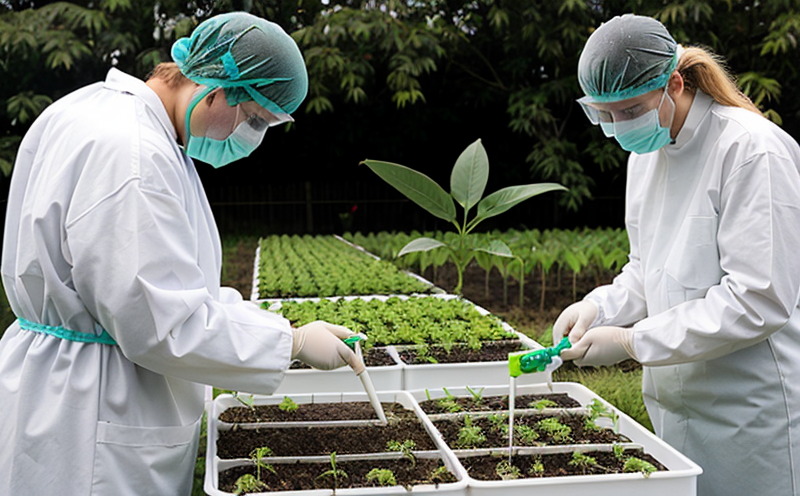Cassava Mosaic Virus Testing
The Cassava Mosaic Virus (CMV) is a significant pathogen affecting Manihot esculenta, commonly known as cassava, which plays an essential role in the global food supply. CMV can cause substantial yield reductions and economic losses for farmers across Africa, Asia, Latin America, and parts of the Caribbean. Accurate diagnosis and control measures are critical to mitigate these impacts.
Our Cassava Mosaic Virus Testing service provides comprehensive analysis tailored to meet the needs of agricultural stakeholders including quality managers, compliance officers, R&D engineers, and procurement teams involved in crop management and sustainability initiatives. Using advanced molecular techniques such as Real-Time PCR (RT-PCR), our laboratory ensures precision and reliability.
For accurate testing, we require clean samples of cassava leaves or stems, harvested under conditions that minimize contamination from other pathogens. The sample must be stored at appropriate temperatures to maintain integrity until it reaches the lab where it undergoes rigorous quality control checks before analysis begins. Our team employs internationally recognized standards like ISO and ASTM guidelines throughout our process.
The testing procedure involves extraction of nucleic acids followed by amplification using specific primers targeting CMV sequences. This method allows for sensitive detection even at very low viral loads present within the plant material. Post-amplification, results are analyzed to determine whether CMV is present and quantify its level if detected.
Our reports provide detailed information about the presence or absence of CMV along with quantitative data when applicable. These findings help guide decisions regarding crop treatment plans aimed at reducing disease spread while enhancing overall plant health. Additionally, our insights contribute valuable input towards broader agricultural research efforts focused on developing resistant varieties and improved cultivation practices.
By partnering with us for Cassava Mosaic Virus Testing services, you gain access to state-of-the-art facilities backed by experienced scientists who understand both the challenges faced in agriculture today as well as emerging trends shaping future solutions. Investing in early detection through our testing ensures better outcomes for your operations, supporting long-term success and sustainability across all aspects of production.
Why It Matters
Cassava Mosaic Virus Testing is crucial for maintaining healthy crops and preventing economic losses associated with plant diseases. Early detection enables timely interventions that can significantly reduce the spread of CMV within fields, protecting yields and ensuring food security. In regions where cassava serves as a primary staple crop, accurate testing becomes even more vital given its importance in sustaining livelihoods.
From an environmental perspective, controlling viral outbreaks helps protect biodiversity by minimizing stressors on natural ecosystems reliant upon healthy plant populations. Furthermore, preventing the transmission of CMV supports sustainable farming practices that promote resilient agricultural systems capable of adapting to changing climatic conditions and market demands.
The ability to quickly identify infected plants allows for targeted management strategies focusing only on affected areas rather than treating entire fields uniformly. This approach not only reduces costs but also decreases unnecessary pesticide applications, fostering a more environmentally friendly approach to farming.
Environmental and Sustainability Contributions
- Reduction in Crop Losses: Accurate testing aids in identifying diseased plants early on so they can be removed before the virus spreads further. This minimizes waste while maximizing resource efficiency, contributing positively to overall sustainability efforts.
- Biodiversity Preservation: By controlling outbreaks through targeted treatments, we help preserve native species that depend on healthy cassava for their survival.
- Energy Savings: Limiting the use of broad-spectrum pesticides reduces energy consumption compared to conventional methods used in large-scale spraying campaigns. This contributes directly to reduced greenhouse gas emissions and lower environmental impact.
Incorporating sustainable practices into daily operations enhances long-term profitability for farmers while promoting responsible stewardship over natural resources. Through precise testing, we contribute significantly towards these goals, ensuring that future generations benefit from a thriving agricultural sector.
Use Cases and Application Examples
Cassava Mosaic Virus Testing finds application in various settings including:
- National Agricultural Research Systems (NARS): To monitor the prevalence of CMV across different regions, providing data for breeding programs aimed at creating resistant varieties.
- Farmers' Co-operatives: Early detection allows co-operative members to prioritize resources towards affected areas rather than treating entire plots uniformly.
- Export Companies: Ensures compliance with international standards ensuring safe trade practices between countries.
The service also supports academic institutions and non-governmental organizations working on projects related to plant health, disease management, and food security. By offering reliable data, our testing contributes valuable knowledge that advances scientific understanding of CMV dynamics.





